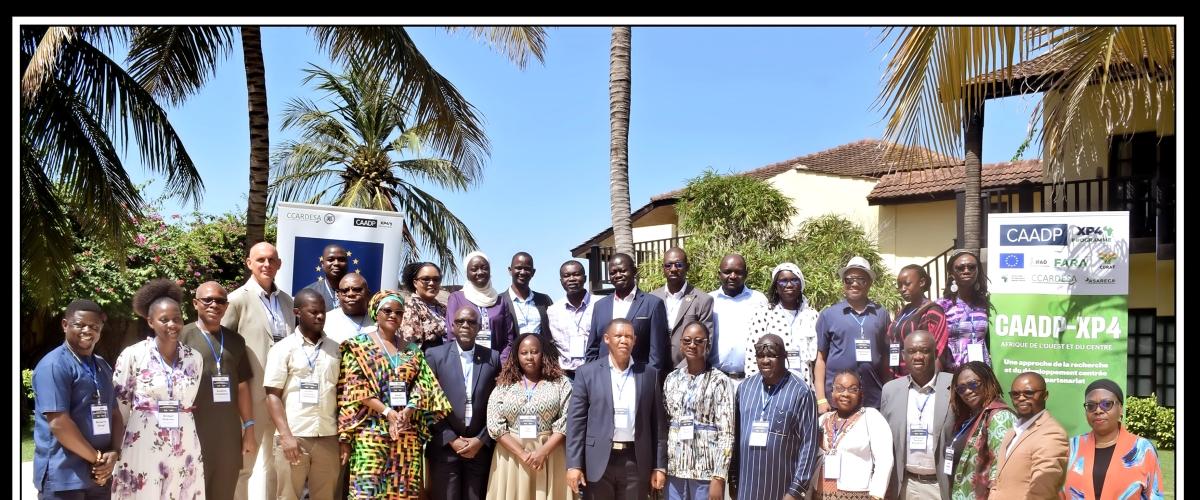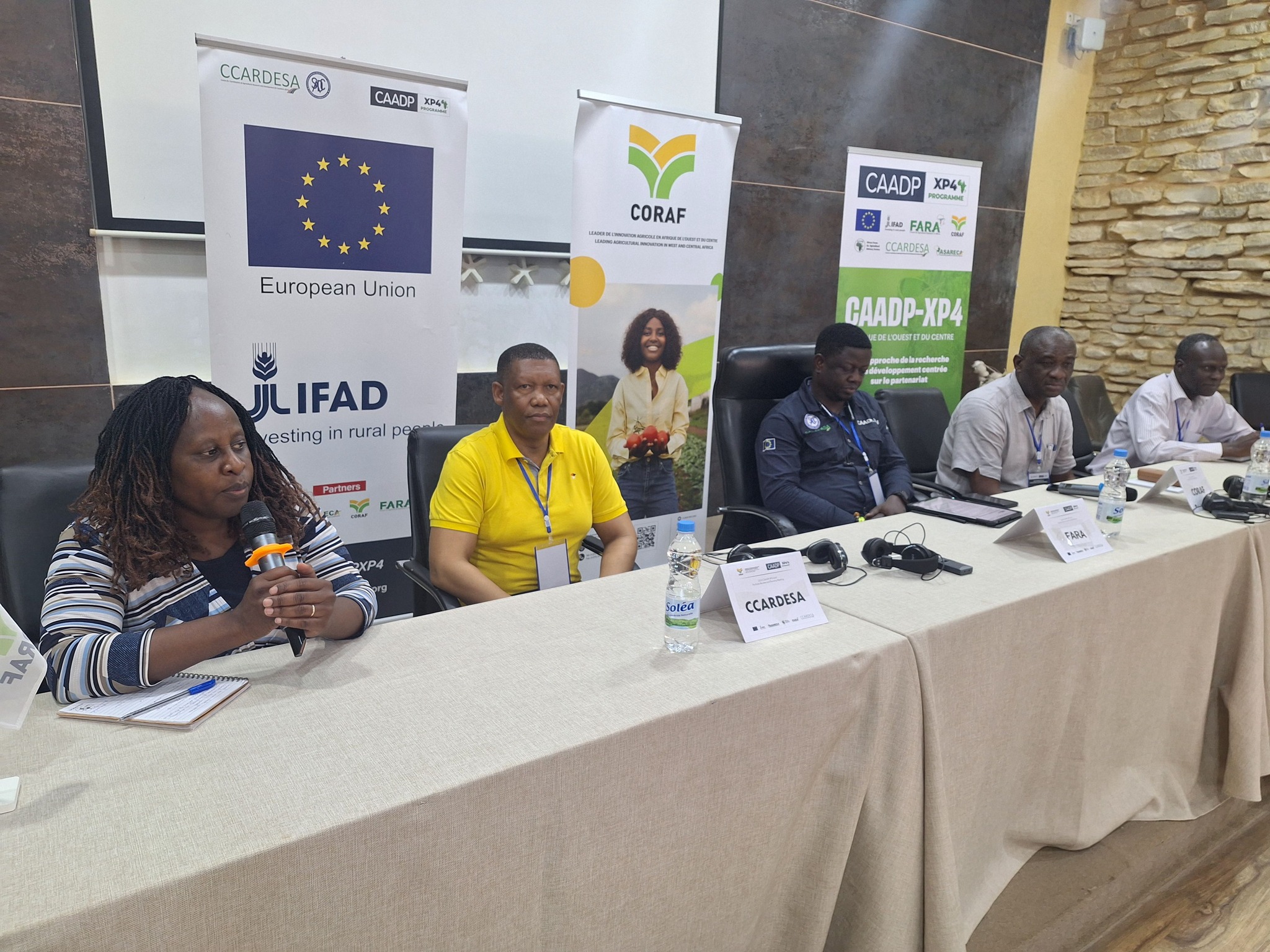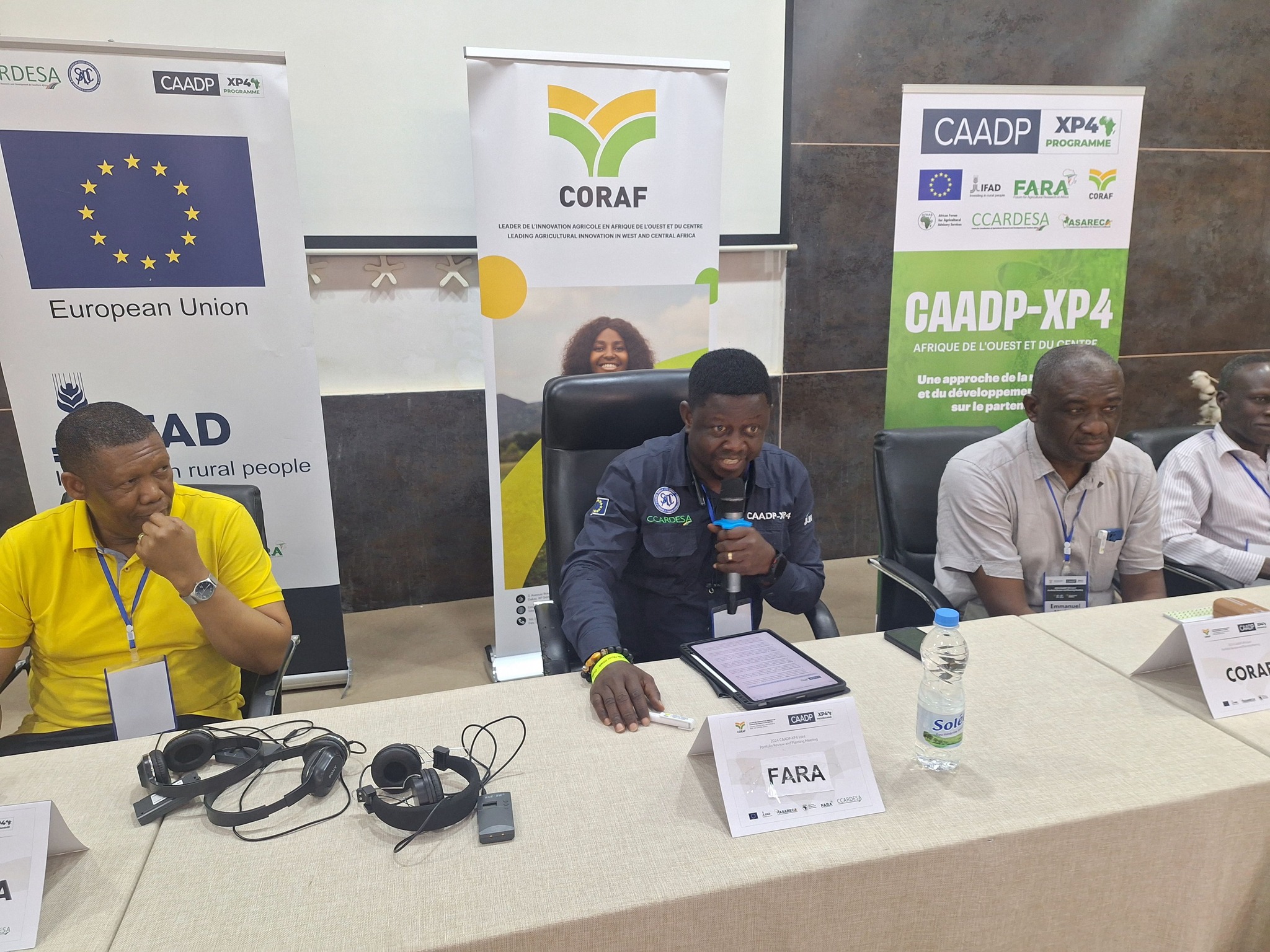
By: Bridget Kakuwa, Benjamin Abugri & Poko Alida Nadinga
October 15 - Saly, Senegal—The vibrant discussions of the CAADP-XP4 Consortium echoed through the halls of the Rhino Resort Hotels & Spa as representatives from across Africa gathered for a crucial Joint Portfolio Review and Planning Meeting from October 13 to 15, 2024. The air was charged with anticipation as stakeholders aimed to finalize strategies for the project's final year, focusing on sustainable agricultural development and integrating pressing issues such as agroecology and digitalization.
The Consortium comprises the African Forum for Agricultural Advisory Services (AFAAS), the Association for Strengthening Agricultural Research in East and Central Africa (ASARECA), the Centre for Coordination of Agricultural Research and Development for Southern Africa (CCARDESA), the West and Central African Council for Agricultural Research and Development (CORAF), and the Forum for Agricultural Research in Africa (FARA).
In opening remarks, Mr. Amine Belhamissi, International Fund for Agricultural Development (IFAD) Technical Advisor, set the tone for the meeting by stressing the need for clarity in communication. “We need to know the SROs' priorities. It appears that you know what your priorities are, but you have not clearly communicated what we need to know,” he stated. His call for establishing robust communication channels resonated with the audience, underscoring the importance of collaboration for collective success.
Dr. Emmanuel Njukwe, Director of Research of CORAF, expressed gratitude to the consortium members for their contributions, celebrating the shared commitment to impactful agricultural initiatives. “By fostering partnerships and focusing on emerging issues like agroecology and digitalization, the CAADP-XP4 consortium is ensuring Africa’s agricultural future remains resilient and adaptable to global challenges,” said Dr Njukwe. He also added that the no-cost extension would give us the time and resources needed to maximize the project’s impact and prepare for a successful transition beyond 2025.
Adding to the spirit of collaboration, Prof. Oluwole Fatunbi, Acting Research and Innovation Director at FARA, reflected on the power of joint efforts. “Our collective work must push us to engage more actively in continental frameworks, " he noted.
The meeting also provided a platform for Dr. Lilian Lihasi of AFAAS to advocate for unity in purpose. “If you want to go far, you must move with others,” she remarked. “We believe we can only be as strong as our weakest link. Mobilizing resources together is essential as CAADP-XP4 ends; our deliverables will speak for us and pave the way for our next steps.”

Dr. Baitsi Podisi from CCARDESA emphasized the importance of inclusivity, acknowledging the significant strides made despite challenges. “CCARDESA is committed to the CAADP-XP4 mandate,” he stated. “We have learned immensely from our interactions with regional partners. Gender is a key area for us, and I applaud the Gender Technical Working Group for its achievements. We must push for deliberate recruitment of women and affirmative action.” Dr. Podisi also said, “We are excited to been assigned the role to lead the establishment of the soil initiative for Africa (SIA) Hub in the CCARDESA region, and we have also reinforced our alignment with the post-Malabo agendas, ensuring that our work translates into real benefits for SADC Member states.”
Mr. Benjamin Abugri, speaking on behalf of FARA, highlighted the necessity of visibility for the consortium’s efforts. “As we approach the final year, it’s essential that we prioritize all key deliverables,” he urged. “Aligning our strategies with agroecology and digitization is crucial. Our achievements must be visible—they serve as proof of our existence for future projects.” Said Mr Abugri.

In his closing remarks, Mr. Moses Odeke, Acting Programme Director from ASARECA, reinforced his commitment to the meeting's decisions. “Failure is not an option; we must succeed in this venture,” he asserted, thanking CORAF for its role in the gathering. He playfully made an invitation to his country as a “revenge visit,” which added a lighthearted note, exemplifying the spirit of camaraderie developed during the meeting.
The meeting yielded a strong collective resolve to enhance resource mobilization and strategic partnerships. The path forward for the CAADP-XP4 Consortium appeared bright, with members expressing optimism about leveraging their collaborative successes to drive innovation and sustainable agricultural practices across the continent.
As the meeting came to a close, the CAADP-XP4 Consortium emerged with a set of pivotal outcomes that will shape its final year and ensure the sustainability of its initiatives. Participants reached a consensus on the strategic need for a one-year no-cost extension to allow more time to finalize essential tasks and address emerging priorities such as agroecology, post-Malabo priorities, the Africa Fertiliser and Soil Health Action Plan, and digitalization into the project framework.
The consortium collectively agreed on a detailed final work plan that integrates existing and new priority areas, ensuring the project remains relevant to current agricultural needs. Additionally, a structured approach for project closure was outlined, complete with timelines for report submissions and preparations for the European Commission’s expected audit, all in alignment with the latest guidelines.
The discussions culminated in formulating a forward-looking sustainability strategy that emphasizes resource mobilization and strengthens partnerships with key stakeholders, particularly One-CGIAR.
This strategy aims to enhance synergies among consortium members and formalize working arrangements under the AARIEIs framework. Furthermore, a comprehensive joint program plan was established to guarantee that all deliverables are met before project closure, ensuring the consortium’s efforts leave a lasting impact on agricultural research and development across Africa. With these outcomes, the CAADP-XP4 Consortium is well-equipped to advance its mission and foster continued collaboration in the years to come.
The CAADP-XP4 Consortium invites partners and stakeholders to actively engage in the project’s final year, contributing to its lasting impact and shaping the future of agricultural development in Africa. The consortium receives financial support from the European Union through the implementation of the International Fund for Agricultural Development (IFAD).





